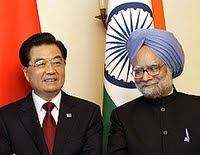JODHPUR, India -- In China, one often hears that it is impossible to govern a population of more than a billion using democracy. The country's phenomenal rise over the past 30 years certainly testifies to the success of its "Leninist corporatism." However, while concerns mount over the sustainability and fairness of this model, India's greater tolerance and openness may become a source of considerable comparative advantage in the quest for regional leadership in the "Asian Century."
The fundamental differences in the two emerging behemoths' social and political attitudes are reflected in their respective approaches to the past. In China, the memory of the colonial experience, compounded by Communist Party propaganda, still frames colonial aggression as a violation that has not yet been avenged. The Chinese Communist Party has long used the promise to restore national pride as a key recruitment and legitimization tactic. This aggrieved attitude dominates contemporary Chinese interactions with the outside world, be it economic, social or cultural.
By contrast, one finds a more nuanced appreciation of the colonial past in India, which experienced complete rather than partial colonial domination. Indians accept that for all its injustices, British rule also benefitted Indian society, in areas such as improved infrastructure and social mobility. Since Independence in 1947, India has produced an expanding body of globally acclaimed post-colonial literature and art that has helped advance the national dialogue concerning the painful elements of the past.

